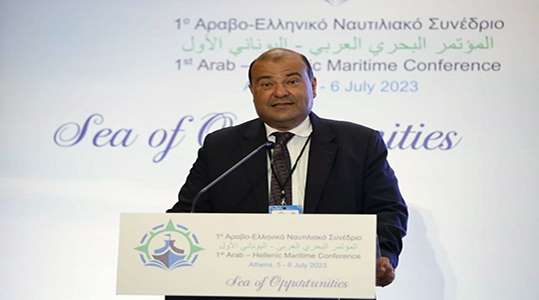The Secretary-General of the Union of Arab Chambers, Dr. Khaled Hanafi, praised the role played by the Arab-Hellenic Chamber of Commerce and Development, which represents the bridge of communication in economic, trade and investment relations between the two sides. He paid tribute to the President of the Chamber, Jeronnicas Harris, and the Secretary General of the Chamber, Mr. Rashad Mebjar, who are playing an exceptional role in the field of developing and strengthening Arab-Greek economic relations and upgrading them to better levels.
In his speech, he congratulated the Chairman of the Suez Canal Authority in the Arab Republic of Egypt, Lieutenant General Osama Rabie, who was a participant in the work of the forum, on the achievements witnessed by the Suez Canal under his presidency of the authority, where the canal's revenues more than doubled.
Khaled Hanafi stressed in the first session of the forum (North African countries), the second section: Libya, Egypt, and Greece, that "the Egyptian-Greek bilateral relations have witnessed a remarkable development at the level of joint coordination on many issues, politically, economically and militarily." Considering that, "there is a political and cultural specificity, between Egypt and Greece, that reflects the ease of cooperation and building strong relations between Egypt and the Mediterranean countries in general, and has been greatly strengthened since the beginning of the era of His Excellency Egyptian President Abdel Fattah Al-Sisi." Stressing, "Egypt's location on the map constitutes a position and location that makes it always an area of influence as Egypt represents Greece's gateway to communicate with African countries and Greece represents a major gateway for Egypt with European countries." Explaining “the maritime demarcation concluded by Egypt with Greece is a historic achievement, as this demarcation allows each of them to maximize the use of the wealth available in their respective exclusive economic zones, especially in the fields of promising oil and gas reserves.”
He said that "Egypt and Greece's progress in signing the exclusive economic zone agreement constitutes a major turning point in the geopolitical balance in the region, as the importance of the exclusive economic zone agreement between Egypt and Greece cannot be considered limited only to the economic aspect, because it has an important strategic dimension that protects Egyptian geopolitical interests.
He stressed that "Egypt is considered a regional energy center, and Egypt's importance to Europe has emerged in light of the energy crisis that resulted from the Russian-Ukrainian war. Egypt became an influential player in this matter by increasing reliance on it as a reliable source for transporting gas or electricity to European countries, as the electrical interconnection projects between Egypt and Greece favor the Egyptian plan. Which is based on transforming into a regional center for energy trading to achieve economic and strategic benefits at all levels."
"Egypt and Greece enjoy a strategic location, and cooperation in the field of navigation, ports, and shipyards is important prospects for cooperation between the two sides in this vital and strategic sector, to enhance the reality of supply chains," he said.
"The Mediterranean countries have many ports, from Greece, Albania, Italy, France, Libya, Tunisia, Algeria, and Morocco. On the other hand, Egypt has the largest port in the Mediterranean basin, the port of Alexandria, which includes the ports of Alexandria, Dekheila, and El Max, in addition to the Suez Canal, which is the main water crossing, is qualified to be a huge logistical crossing to Africa, Europe and the rest of the world.
He explained, "Egypt has 15 ports, and there is a presidential directive to develop them simultaneously so that there will be a renaissance in Egyptian ports, and in this case, Egypt will have a fair share more than container traffic or trade in the Mediterranean ports."
He concluded by saying that "the new vision of the State of Egypt by 2030 is for Egypt to deal with 30 million containers, considering that transit trade is the trade of the future."
At the opening of the Arab-Greek Economic Forum, the Secretary-General of the Union stressed, "What is required today more than ever is to consolidate institutional cooperation between the Arab and Greek sides, through the signing of more agreements that would facilitate free trade exchange. It is also necessary to lift the restrictions that hinder the movement of businessmen and investors in both directions. As well as the adoption of more legislation, laws, and protocols that reduce the burdens and obstacles, which lead to a decline in the volume of investments instead of raising them to suit the capabilities possessed by the Arab economies and the Greek economy as well as the rest of the economies of European countries.
He noted, "Many Arab countries can play a pivotal role with the friendly Republic of Greece, in linking the markets of Central and Eastern Europe, the markets of the Arab Gulf countries, and the continent of Africa commercially. Where there are huge opportunities for trade cooperation between the Arab and Greek sides in the field of establishing logistics centers and free trade zones, contracting, information technology, agricultural development, food industries, energy, and digital technology, as well as in various sectors of infrastructure, traditional and renewable energy, industry, sustainable agriculture, and services. Finance, banking, tourism, health, telecommunications, transport, shipping and services sectors, port and construction industries."
Source (Union of Arab Chambers)

